Coin Center Travel Series: Lisbon, Portugal
A fledgling cryptocurrency community takes root in a former hub of globalization
A fledgling cryptocurrency community takes root in a former hub of globalization
This is the second installment of Coin Center’s multi-part travel series examining how cryptocurrency is used around the world.
A lot of time has passed since Portugal’s Age of Discovery. Over five hundred years ago, caravels and explorers would depart from Lisbon’s harbor. Chasing riches and dreams of the day (e.g. the ultimately fictitious land of Prester John), their discoveries busted long-held myths, helped build the first global maritime trading network and brought prosperity to their homeland at the westernmost tip of Europe.
After an economically tumultuous decade, Portugal is now trying to ride a new digital wave of globalization. The capital city, Lisbon, hosts the annual Web Summit and, this summer, the Building on Bitcoin Conference will be held here. The welcome of Bitcoin’s technical community is in large part due to the small but growing cryptocurrency/blockchain community that has recently emerged. The speculative community chases riches while the technical community chases dreams of decentralization – all within a vacuum of neither government awareness nor action.
One afternoon I wandered-up to a nondescript apartment block, rang the buzzer, walked to the first floor and was greeted at the door of what for a second felt like the wrong apartment. I had arrived at The Block Café. Kevin and Marc, who are members of the French-speaking crypto developer community,opened the café in January 2018 after moving to Lisbon the previous year.
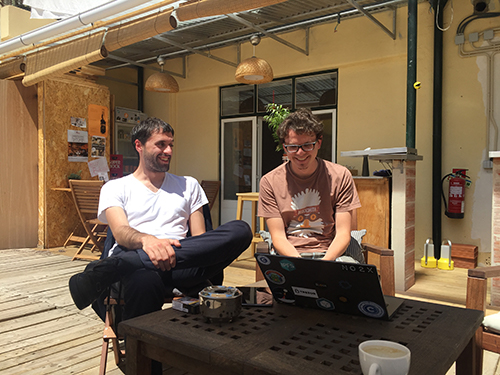
The idea behind The Block Café, Marc explained to me, is to, “create, support and educate” the growing development community attracted by the opportunities afforded by networks like Ethereum. The café was financed with small contributions from across the crypto community. “This is the worst investment [in a short term financial return on investment sense] that I’ve ever made”, was how Marc jokingly described one investor’s reaction. The investment will hopefully pay off by other means, in the long-term, if it contributes to the continued growth of this nascent community.
A proudly technical and highly experienced crowd gather at the café. “No price or speculation here, that’s for the other group down the road,” I was told. Members share technical advice, critique one another’s projects in the co-working space, and enjoy casual discussion during afternoons on the rear terrace in the sun. Events are held throughout the week on whatever the community wishes to do whether that be yoga, introductions to set-up a wallet securely or specialized technical classes.
One of the current occupants of the café’s co-working space is the team behind Intimate. They are creating a token that they hope will facilitate the provision of a variety of payment, reputation and identity services to workers in the adult industry. CEO Reuben Coppa, COO Nathan Smale and CFO Alex Dohi sat down with me one afternoon over lunch to explain their journey.
“The banking industry shuts out the adult industry… and banks screw-up cross-border transactions”, Reuben explained. “There’s demand out there for [digital] reputation that can follow people from platform-to-platform, a two-party escrow system and a way to prove who is who online”.
All Australian nationals, the Intimate team was attracted to Lisbon because, “of the sun, surf and tech community.” The Portuguese StartUp visa makes immigration easy. “They actually want you to come”, was how they described it to me.
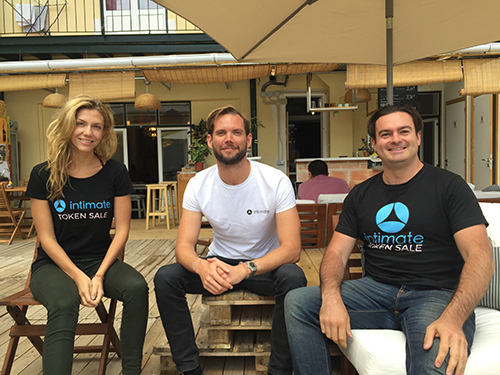
Although immigration hasn’t posed issues, Intimate faces a challenging combination of navigating both the crypto laws and regulations as well as those pertaining to the adult industry in all the countries in which they wish to operate. These challenges are particularly acute in the United States. “We decided it is too hard to do in the US… though there’s a large market there”, Reuben explained. The challenges include vagueness around application of securities regulations, the recent passing of FOSTA/SOSTA federal legislation and a less permissive culture of the adult industry than in Europe or Asia.
Time will tell whether Intimate’s approach is ultimately successful. For the moment, they have identified a commonly disenfranchised and unbanked group in countries worldwide and a business-to-business market that faces expensive or inaccessible banking services. (Readers will notice that this is a recurring feature in our series with Wala in Cape Town).
The Portuguese government has been conspicuously absent in providing guidance on the legal and regulatory issues surrounding cryptos. It is likely that Portugal’s government is awaiting the outcome of the policymaking process in Brussels before making any large moves. As Portugal is a European Union member, the legal and regulatory vacuum has attracted many in Lisbon’s crypto community from other EU countries. Their motivations for moving are varied. One particularly relevant reason is the lack of capital gains taxes on cryptos. At the same time, many seek cheaper living costs. “It’s not just about escaping taxes… it is mostly about the high cost of living in London or Paris”, was how Marc explained his decision to re-locate to Lisbon to me. “I don’t mind paying some tax but why lose 70% of my money on rent and living expenses?”
To hear a bit more about how Portugal compares to other countries, one evening I attended a talk on Blockchain and Regulations in the EU and US by Xaviere Lavayssiere. Around thirty people filled the room to hear about the intricacies of and unresolved issues surrounding coins, tokens, hard-forks and airdrops. “The US is probably one of the worst countries for ICOs”, was one of Xaviere’s final talking points. The lack of clarity as to whether the Howey security test applies to which manifestations of crypto, something that the team at Intimate also mentioned, is at the center of these issues. For an internationally mobile community that seeks to build sustainable businesses without regulatory risk, this is a hot and recurring topic. (The SEC has since provided some more clarity in this area).
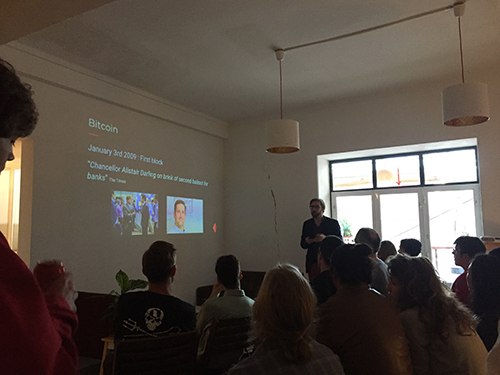
There are not many ways to spend cryptocurrencies in Lisbon. A couple of online retailers, like Alzashop, accept it. The Block Café also accepts payments in Bitcoin or Ethereum for obvious reasons. Apart from that, I could not find any other merchants around town. One afternoon I tried to stop-by Lisbon’s only Bitcoin ATM. From what I could gather, the ATM was located in a high-tech cinema within a shopping center. After walking around in circles for around fifteen minutes, I checked for more information online. It turns out that the high-tech cinema closed within two years of its opening. The owner blamed, “the distributors and the ‘mediocrity’ of the Portuguese public for the closure.” Lisbon’s only Bitcoin ATM went with it.
One afternoon while working at The Block Café, Kevin rushed-up to speak with me. “I think the company you met with yesterday is not really an exchange!” I had unknowingly met with yet another suspected “multi-level marketing” company (aka: pyramid scheme). This particular one claimed to be running a new crypto-to-fiat exchange in Lisbon on a membership basis. These schemes operate legally by working their way around existing laws and regulations (and are another recurring feature in the series so far).
For something that The Economist calls “The Trust Machine”, it is striking how difficult it is to parse and understand what is really going-on in blockchain-land. The local technical folks were able to pick this suspect scheme out almost immediately. They have developed a finely-tuned fraud detection sense. As someone who spends a lot of time following this space, I thought that I would be able to detect the strangeness of someone insisting on their ‘transparency’ and ‘openness’. Those characteristics should be self-evident, and not need to be explicitly said, if indeed they are true. After this incident I began questioning what to believe and who to trust – and why? It turns out that these are central concepts to understanding the growing interest in and demand for cryptocurrencies and blockchain.
“When people are thinking about money they aren’t thinking with their heads” was how Pedro, one of my Uber drivers, neatly summed-up his experience with cryptos earlier this year. After hearing about the conspicuous spike in the market price of Bitcoin last December, he considered buying a little. In the end he passed. It’s not that he is risk-averse though. He insisted: “I like to gamble on sports”.
As our discussion meandered, Pedro told me about one of his friends who had held his life savings in shares of Banco Espírito Santo (Holy Spirit Bank). Founded in 1968, it collapsed in August 2014. All the way up until the collapse, bank and government officials claimed that the bank had sound finances. The shareholders were subsequently wiped out and so were the life-savings of Pedro’s friend.
We ended-up wondering aloud whether Bitcoin is any riskier or more opaque than other investments? After all, assurances from government officials or regulated financial institutions should ideally be sufficient. Yet they are not always. Learning about this recent financial history, the effect it had on some Portuguese people today, and their perceptions of and relationship with cryptocurrencies, I decided to look back at what past events had led them to this point today.
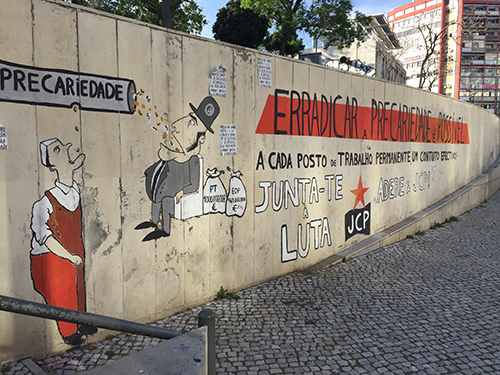
The Museu de Dinheiro (the ‘Museum of Money’), adjacent to the Banco de Portugal (the Reserve Bank of Portugal), is housed in what used to be a church. The museum provides a surprisingly engaging history of money through the ages. Learning about Portugal’s monetary history helped me understand better the stories and concerns expressed by some of the people who I had met in Lisbon over the past month.
There is a lot of succinct and insightful knowledge throughout the museum. One panel reads: “The images shown on them [coins], the metal they’re made from, the place where they were minted and their scarcity or abundance can tell us about the political, economic, social and even cultural incidents and circumstances that were the context for their creation”. It occurred to me that the present growth of the cryptocurrency movement is as linked to the periodic failure of institutions, like Banco Espíritu Santo’s 2014 collapse, as Bitcoin’s origin was to the financial crisis and bailouts of 2007-2008.
Another panel read: “Safety and trust, essential factors for money’s acceptance, were the main driving forces that led to today’s technological sophistication”. The Portuguese have learned throughout their history the consequences when this safety and trust break down.
When revolutionaries overthrew the Monarchy in 1911, they replaced the Réal (‘royal’) with the Escudo (‘shield’). The royal coat of arms was kept on the new bills perhaps as a way of asserting authority via royal lineage. Within twenty years holders of the Escudo had been wiped-out due to a combination of government overspending, excessive overseas borrowing and a counterfeit currency scheme engineered in conjunction with officials from the Banco de Portugal. In a twist of fate, Salazar, the incoming Prime Minister, who would occupy the position for over forty years, was a former Professor of Economics and noted expert in… inflation.
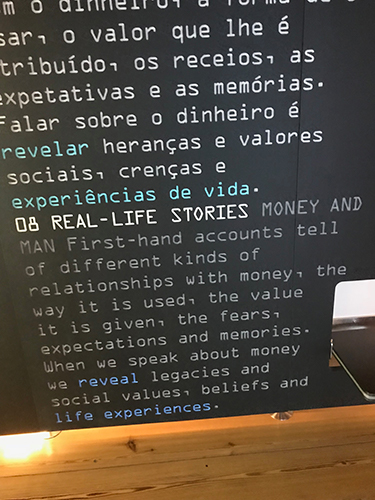
US dollar bills today read, “In God We Trust”. When speaking about fiat currency in particular there is commonly an explicit emphasis on trust in the issuing institution and the people who manage it.
What do we trust and why do we trust it? This question keeps arising in conversations with the people I meet and in my experiences over the past two months. The answers to these recurring questions differ depending on the place that I’m in, the people who live in that place, and their experiences.
For the citizens of Portugal, is it any more ridiculous to trust mathematically-enforced, abstract cryptocurrencies than it is to trust in institutions and people who have a periodic tendency to debase the currency – complete with imprinted royal seals – and to defraud investors? On the other hand, pyramid schemes disguised as crypto-to-fiat exchanges don’t help build trust in cryptocurrencies either.
Over-and-over again during the month in Lisbon I found myself reexamining what the foundation of trust is in the things that I see and the claims that I’m given. Perhaps it’s an artifact of the time in which we presently live? – a time in which cryptocurrencies are in ascendance.
